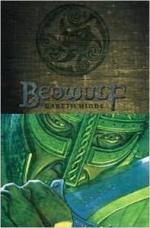|
This section contains 6,419 words (approx. 22 pages at 300 words per page) |

|
SOURCE: "The Essential Paganism of Beowulf," in Modern Language Quarterly, Vol. XXVIII, No. 1, March, 1967, pp. 3-18.
In the following excerpt, Moorman identifies a pessimistic tone running through Beowulf and argues that it is the product of a pagan rather than a Christian view of life.
One has only to glance at the criticism devoted to Beowulf in the last sixty years to see how firmly entrenched the so-called Christian interpretation of our chief Anglo-Saxon poem has become. Specialized studies, such as M. B. McNamee's interpretation of the poem as an "allegory of salvation," Marie Hamilton's view of the poem as reflecting the Augustinian doctrines of grace and providence, and the patristical studies of D. W. Rob ertson, Jr., R. E. Kaske, and Morton W. Bloomfield, as well as the more general treatments of A. G. Brodeur and Dorothy Whitelock, have apparently solidified Frederick Klaeber's original assertion that "Predominantly...
|
This section contains 6,419 words (approx. 22 pages at 300 words per page) |

|


